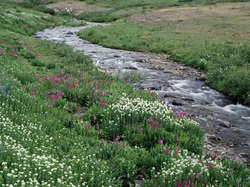Organic Gardening - A practice in Sustainability

Six Reasons For Organic Gardening
Organic gardening is a way of growing vegetables and fruits with the use of resources only found in nature. Organic gardening eliminates the dangerous toxins found in and on commercially grown food; it protects the soil, wildlife and your health.
Why would anyone want to join the movement towards organic gardening?
Here are six very good reasons.
1. Organic gardening doesn’t use chemicals that may have an adverse affect on your health. This is especially important when growing vegetables. Chemical companies tell us that the chemicals we use are safe "if used according to direction," but research shows that even tiny amounts of poisons absorbed through the skin can cause such things as cancer and learning disorders, especially in children.
2. On the average, a child ingests four to five times more cancer-causing pesticides from foods than an adult. This can lead to various diseases later on in the child's life. With organic gardening, these incidents are lessened. Remember, pesticides contain toxins that have only one purpose - to kill living things. Those chemicals also pollute the air, land and water going far beyond their intended purpose.
3. Less harm to the environment. Poisons are often washed into our waterways, causing death to the native fish and polluting their habitat. Animals that eat the fish are poisoned - this includes humans!
4. Organic farming practices help prevent the loss of topsoil through erosion. The Soil Conservation Service says that an estimated 30 - 32 billion tons of soil erodes from United States farmlands every year. Topsoil is the life line of farming - without good topsoil, more chemicals are needed to grow crops and a vicious cycle starts.
5. Cost savings. You don’t need to buy costly chemical fertilizers and pesticides with organic gardening. Many organic recipes for the control of pest and disease come straight from the kitchen cupboard. For example, mixing 1 tablespoon of liquid soap (make sure it is soap) and 1 cup of cooking oil can make a cheap garden pest spray. Put 3 tablespoons of this mixture in 1 quart of water and spray on plants (always test spray first).
Sometimes other plants can be grown as companions to the main crop. An example of this is the marigold, which helps to repel aphids from vegetables. Another is garlic, which helps to repel the hookworm from tomatoes.
6. A simple mulch of pine needles, old newspapers or bark shavings will help to suppress the growth of weeds as well as keeping the moisture in. This is also a great way to recycle paper; use your shredded paper as mulch to provide weed block, moisture retention and reduce the tracking of dirt into the house.
Organic gardening practices help to keep the environment safe for future generations. To find out how you can enjoy the freshness of REAL FOOD straight from your own garden – check out Helen Anderson’s fully comprehensive book on Organic Gardening here.
Organic gardening is a way of growing vegetables and fruits with the use of resources only found in nature. Organic gardening eliminates the dangerous toxins found in and on commercially grown food; it protects the soil, wildlife and your health.
Why would anyone want to join the movement towards organic gardening?
Here are six very good reasons.
1. Organic gardening doesn’t use chemicals that may have an adverse affect on your health. This is especially important when growing vegetables. Chemical companies tell us that the chemicals we use are safe "if used according to direction," but research shows that even tiny amounts of poisons absorbed through the skin can cause such things as cancer and learning disorders, especially in children.
2. On the average, a child ingests four to five times more cancer-causing pesticides from foods than an adult. This can lead to various diseases later on in the child's life. With organic gardening, these incidents are lessened. Remember, pesticides contain toxins that have only one purpose - to kill living things. Those chemicals also pollute the air, land and water going far beyond their intended purpose.
3. Less harm to the environment. Poisons are often washed into our waterways, causing death to the native fish and polluting their habitat. Animals that eat the fish are poisoned - this includes humans!
4. Organic farming practices help prevent the loss of topsoil through erosion. The Soil Conservation Service says that an estimated 30 - 32 billion tons of soil erodes from United States farmlands every year. Topsoil is the life line of farming - without good topsoil, more chemicals are needed to grow crops and a vicious cycle starts.
5. Cost savings. You don’t need to buy costly chemical fertilizers and pesticides with organic gardening. Many organic recipes for the control of pest and disease come straight from the kitchen cupboard. For example, mixing 1 tablespoon of liquid soap (make sure it is soap) and 1 cup of cooking oil can make a cheap garden pest spray. Put 3 tablespoons of this mixture in 1 quart of water and spray on plants (always test spray first).
Sometimes other plants can be grown as companions to the main crop. An example of this is the marigold, which helps to repel aphids from vegetables. Another is garlic, which helps to repel the hookworm from tomatoes.
6. A simple mulch of pine needles, old newspapers or bark shavings will help to suppress the growth of weeds as well as keeping the moisture in. This is also a great way to recycle paper; use your shredded paper as mulch to provide weed block, moisture retention and reduce the tracking of dirt into the house.
Organic gardening practices help to keep the environment safe for future generations. To find out how you can enjoy the freshness of REAL FOOD straight from your own garden – check out Helen Anderson’s fully comprehensive book on Organic Gardening here.
